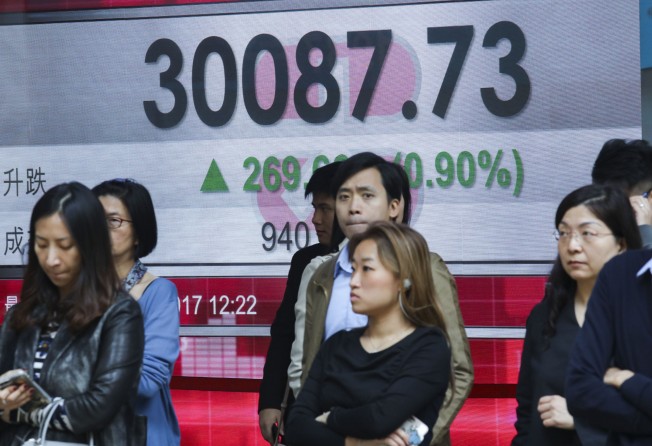China’s new-economy sector to push Hang Seng Index to 32,000 next year, says Goldman
Goldman Sachs and HSBC both predict solid Chinese corporate earnings growth in 2018

The rise of China’s “new-economy” stocks will help push Hong Kong’s benchmark Hang Seng Index to a historic high of 32,000 by the end of next year, according to Goldman Sachs.
An estimated US$50 billion of mainland capital flowing into Hong Kong equities will also provide support, said Kinger Lau, the investment bank’s chief China strategist, who sees the MSCI China index climbing to 100 in the next 12 months.
“This year’s rally has been fundamentally driven,” Lau said on Friday.
So far this year, the Hang Seng Index and MSCI China have soared 35 per cent and 55 per cent respectively to stand at 29,866.32 and 91 by Friday afternoon.
Lau sees them reaching 32,000 and 100 separately by the end of 2018.
Corporate earnings growth among MSCI China component companies accelerated to 20 per cent in the first nine months of 2017, the best since 2010.
Lau said the growth rate will remain high, at 18 per cent, in 2018, with technology and “New China” sectors contributing the most.
By “New China”, Lau was referring to sectors including health care, e-commerce and entertainment.
Fundamentals aside, liquidity should also remain positive next year, Lau added.
Southbound net buying of Hong Kong-listed stocks has reached US$38 billion so far this year, one of the main driving forces behind the 35 per cent surge in the Hang Seng Index.
That figure could jump to US$50 billion in 2018, as mainland investors are still keen to diversify their asset portfolios and hedge against the risk of volatility in the yuan.
“It [the demand] will be a mid-to-long term trend,” Lau said.
As well as mainland cash, global mutual funds could increase investments in Hong Kong and Chinese equities, as their current allocations are “light”.
Even for “hot” names such as technology titans Tencent and Alibaba, global investors are still underweight.
“With the macro and earnings growth momentum likely staying healthy in 2018, and China still being priced at meaningful valuation discounts to its global alternatives, we see upside liquidity risk from global mutual funds in 2018.”
China’s domestic capital will flow to equities from property as well, with roughly 330 billion yuan of incremental capital estimated to be reallocated in 2018, according to the bank.
Among the top sectors, Goldman suggests “overweight” on Chinese banks, insurers, brokers, and health care companies, while putting “market weight” on IT, industrials, and consumer stocks.
Separately, HSBC is predicting 2018 will be another good year for Asian equities, supported by a weaker US dollar, stronger China growth, and an earnings upgrade cycle.
“Some of the best equity performers of 2017 were the Chinese internet names. Their high growth
is likely to continue in 2018, albeit maybe at a slightly lower level,” said Herald van der Linde, head of equity strategy in Asia-Pacific for HSBC, in a recent note.
“The interesting development in 2018 will be a raft of new Chinese internet companies that aim to list – ranging from fintech names to online video companies and online publishing platforms as well as Alipay, Alibaba’s payment platform.”
Besides Chinese internet stocks, the outlook for the consumer sector looks healthy in 2018, while property stocks could be muted, he added.
However, the HSBC analyst warned investors of risks when the US Federal Reserve continues unwinding its balance sheet in 2018, which may introduce more volatility into equities in Asia.